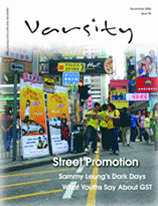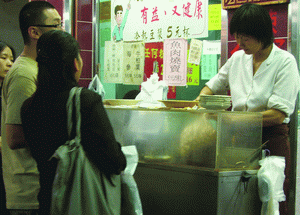


Our Community
To tax or not to tax
That’s a question that local youths have not been asked in the GST debate.
by Ruby Wu
Local young people, who are the future taxpayers, have been left out of the public debate over whether the government should impose a goods and services tax (GST) to ensure a stable source of income for its coffers.
The government says the issue will not affect the youths much and some academics consider the pain will be more for parents to bear if a GST is levied.
Young people fail to voice their opinions of the government proposal amid strong opposition from different sectors to the planned tax.
Some members of the young generation do worry that a GST, or value-added tax, may increase their financial burden, including that on tuition fees. They expect their consumption will be affected if the proposed levy is implemented.
Pau Ka-yan, an economics and finance student at the University of Hong Kong , said young people’s budget was tight. A new tax on most of the goods and services, no matter how small its percentage is, will “matter quite a lot” to them, she said.
Wong Ka-yi, a student of government and politics at the Chinese University of Hong Kong , said: “(Such a) tax will weaken our consumption power. Youngsters will have to pay more and buy less.”
The government has proposed a GST to broaden the city’s narrow tax base in order to provide the government with a stable income to withstand future economic and social challenges. In a consultation paper, the government said GST was “the most viable option” to achieve those goals.
The public is being asked to submit their views on the matter to the government before the consultation ends in March next year.
Explaining the possible impact of a GST to society, economics professor Francis Lui Ting-ming of the Hong Kong University of Science and Technology said people’s mode of consumption might change if the levy was imposed. “Teenagers will shift their spending from commodity intensive consumption to time intensive consumption, like books andmovies,” said Professor Lui, who is the director of the university’s Centre for Economic Development.
For example, people will watch movies more frequently, which is a kind of time intensive consumption, the scholar said. “But they will spend less on snacks (for movies), which are commodity intensive,” he cited.
OTHER STORIES IN OUR COMMUNITY
Students flock to tutors for more than flashy image

Not many young people have voiced their opinions on
the GST proposal.
